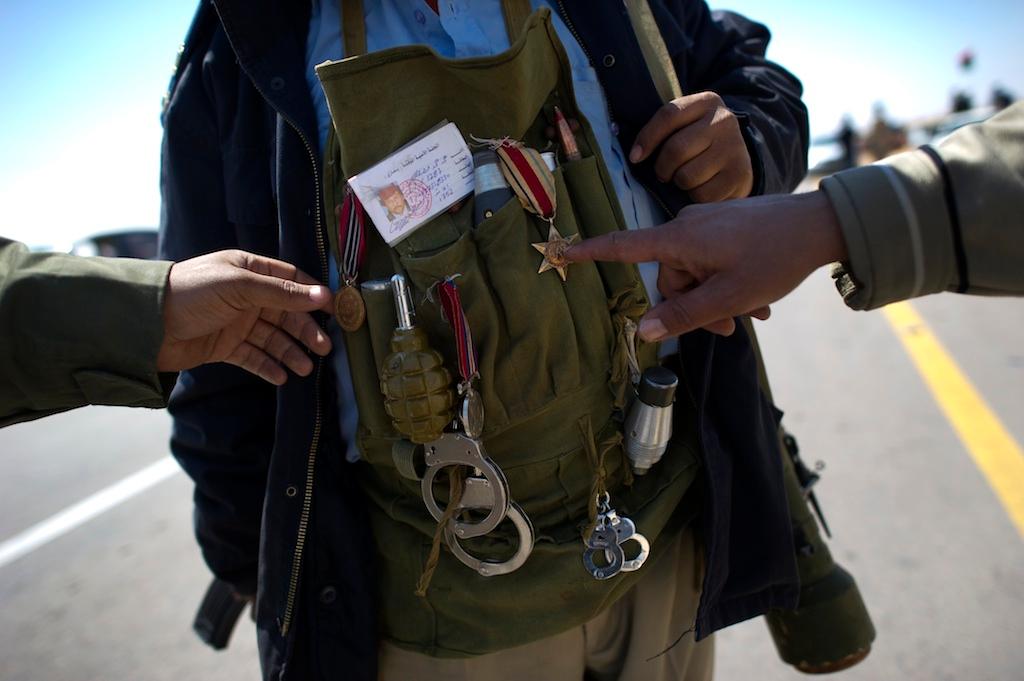Musa Kusa’s financial sanctions dropped by US (UPDATES)
A Libyan rebel points to the medal of a comrade near Brega on April 4, 2011.
BREGA, Libya — The United States dropped its financial sanctions Monday against a top Libyan official who defected, Musa Kusa, as rebel forces scored some key diplomatic and military victories.
Kusa, who fled to Britain last week, was Libya's longtime intelligence chief and foreign minister and is accused of being closely connected to terrorist attacks, assassinations and murders over the past three decades.
The administration of U.S. President Barack Obama chose to unfreeze his bank accounts and permit business dealings with him in an effort to encourage other senior aides to abandon Libyan leader Muammar Gaddafi, the New York Times reported.
Rebels and Gaddafi's forces have been fighting for control of Libya for close to two months.
“One of the intended purposes of sanctions against senior officials in the Libyan government was to motivate individuals within the Gaddafi regime to make the right decision and dissociate themselves from Gaddafi and his government,” said David S. Cohen, the acting treasury under secretary for terrorism and financial intelligence, in a statement accordingt to the Times.
Cohen added that the sanctions were dropped because Kusa was no longer a Libyan government official.
Kusa has been accused of links to the 1988 Lockerbie bombing and the killing of British police officer Yvonne Fletcher outside the Libyan Embassy in London in 1984.
In an interview with the BBC, the Libyan leader's son Saif al-Islam Gaddafi denied Kusa knew incriminating information about Lockerbie and other incidents and denied the former foreign minister had defected. He said Kusa was in London seeking medical help.
Gaddafi's son also said that his father was open to political reform in Libya but must stay in power to avoid a dangerous power vacuum.
On Monday, Italy recognized the rebel forces fighting against Gaddafi as the sole "legitimate interlocutor" in the country, Italian Foreign Minister Franco Frattini told a news conference, according to the Wall Street Journal.
Italy, which is the third country after France and Qatar to recognize the rebel-backed Libyan National Transitional Council as the country's legitimate government, said it plans to send an envoy to meet with the rebels in the coming days.
Italy is Libya's largest trading partner and the biggest buyer of the country's oil and natural gas supplies. The move represented a significant boost for the rebels.
"Italy, which imports a quarter of its oil and 10 percent of its natural gas from Libya, is eager to revive Italy's access to oil production now in rebel territory," the Journal reported.
Kuwait is expected to recognize the rebels' Council as the legitimate government in the coming days as well, according to the Washington Post.
Acting Libyan Foreign Minister Abdul Ati al-Obeidi arrived in Turkey after meeting with Greek Prime Minister George Papandreou in an attempt to convey a message from Gaddafi that he wanted to end the conflict.
Turkey and Greece have said they will listen to both sides about the best way to bring about a political solution, the Washington Post reported. However, Italy's Frattini dismissed Obeidi's proposals as "not credible."
“Any solution for the future of Libya has a precondition: that Gaddafi’s regime leaves … that Gaddafi himself and the family leave the country,” Frattini told reporters in Rome, according to the Post.
The Libyan government said Gaddafi must be part of any political reform package, Reuters reported.
"We could have any political system, any changes: constitution, election, anything. But the leader has to lead this forward," government spokesman Mussa Ibrahim said.
Meanwhile, the war is bogged down in the strategic oil town of Brega, about 500 miles east of Tripoli. The town has changed hands six times in as many weeks.
Rebel forces reached the gates of Brega on Monday in an attempt to retake the city from Gaddafi's forces. The rebel military, in a sign that it is learning from past mistakes, said they would hold Brega before advancing again, according to General Ahmed Kitrani, a Benghazi brigade commander.
“We’re making a defensive line so not to lose it again,” Kitrani told GlobalPost.
In Benghazi, some opposition groups were becoming dissatisfied with the air strikes since NATO took over, both because of a friendly-fire incident in which 13 rebel volunteers were killed over the weekend, and a perception that the air strikes have slowed down — a possible prelude to concessions by the international community for Gaddafi or his sons. There were small protests against the NATO strikes on Monday.
“From Tuesday there have been no air strikes, but they killed our rebels,” said Omar Mustafa, a father of six girls. “We don’t know why NATO is not working. We think there maybe a conspiracy for the oil moon of Ras Lanuf, Brega and Sedra.”
As the rebels surrounded Brega, evacuees of Misurata accused Gaddafi's forces of committing atrocities against civilians there, Reuters reported. Evacuees said troops were using tanks and snipers against residents.
"You have to visit Misurata to see the massacre by Gaddafi," Omar Boubaker, 40, told Reuters after being brought to the Tunisian port of Sfax by a French aid group. "Corpses are in the street. Hospitals are overflowing."
We want to hear your feedback so we can keep improving our website, theworld.org. Please fill out this quick survey and let us know your thoughts (your answers will be anonymous). Thanks for your time!
